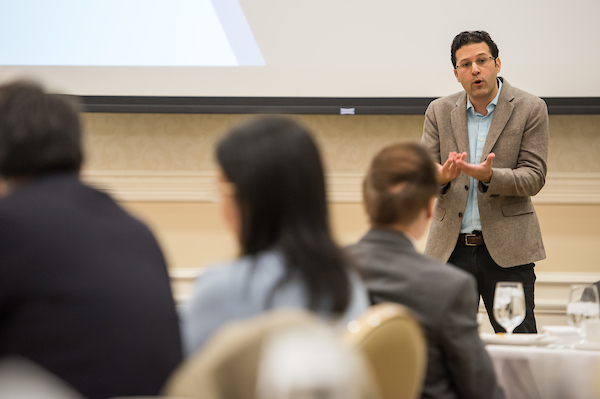Latina/o Studies Association Conference
This summer, Notre Dame hosted the fourth biennial conference of the Latina/o Studies Association (LSA) after a hiatus during the COVID-19 pandemic.
The LSA is a national nonprofit organization that promotes academic scholarship and exchange, as well as professional opportunities, around the topic of Latina/o studies. Since 2014, the organization has done this through a variety of in-person and virtual opportunities, the largest of which is a biennial conference. The theme of the conference changes along with the location, and is meant to reflect a modern challenge for the Latina/o/x community.
The 2022 conference, “Centering Blackness, Challenging Latinidad,” drew more than 400 academics, students, artists, writers, and

filmmakers to a dialogue about the racial justice reckoning in the U.S., largely inspired by the 2020 killing of George Floyd. The conference focused on the challenges of Black Latinos and the systemic forms of racism against Black Latino communities. In addition to the conference assemblies and roundtable discussions, the LSA also set up an “LSA Plaza” where participants could engage with artists, enjoy book and poetry readings, and speak with publishers or community groups.
Marisel Moreno, the Rev. John A. O’Brien Associate Professor of Latina/o Literature, and Paloma Garcia-Lopez, associate director of the University’s Institute for Latino Studies, served as chairs of the LSA Site Committee. Several other faculty members served on the site committee or were invited to speak throughout the conference.
“We felt compelled to revisit the main topic of the conference as a response to current events and the issues of racism and anti-Blackness we are facing as a nation—and globally,” Moreno said. “This is a unique opportunity to host our scholarly and community gathering around a very urgent topic that can help us make a difference in terms of how the field is shaped moving forward.”
“It’s also a concrete way for our University to participate in crucial dialogues around issues of racism and anti-Blackness. One of my greatest hopes is that this gathering, and the ideas that we share, are inspiring especially to younger faculty and graduate students and that our conversations help to shape their own research and to ignite in them an interest in exploring topics that have been silenced or understudied up to now.”
In 2021, also largely influenced by the killings of George Floyd, Breonna Taylor, and Daunte Wright, Notre Dame’s Board of Trustees released a report on diversity, equity, and inclusion that underscored the urgency to use resources and talent to become a home for all. In that, Notre Dame recommitted to defending the dignity of every human person, to promoting a just society, and to attend to the needs of the most vulnerable. In short, it acknowledged it needed to address racism, inequality, and discrimination, and to reflect that commitment across campus.
The Constitutions of the Congregation of Holy Cross state:
“There are networks of privilege, prejudice, and power so commonplace that often neither oppressors nor victims are aware of them. We must be aware and also understanding by reason of fellowship with the impoverished and by reason of patient learning. For the kingdom to come in this world, disciples must have the competence to see and the courage to act.”
By hosting events like the LSA conference, Notre Dame offers a place to gain both competence and courage. And in hosting LSA, bearing witness to these challenges, and openly wrestling with these themes, Notre Dame will become an even more inclusive and welcoming place for all.